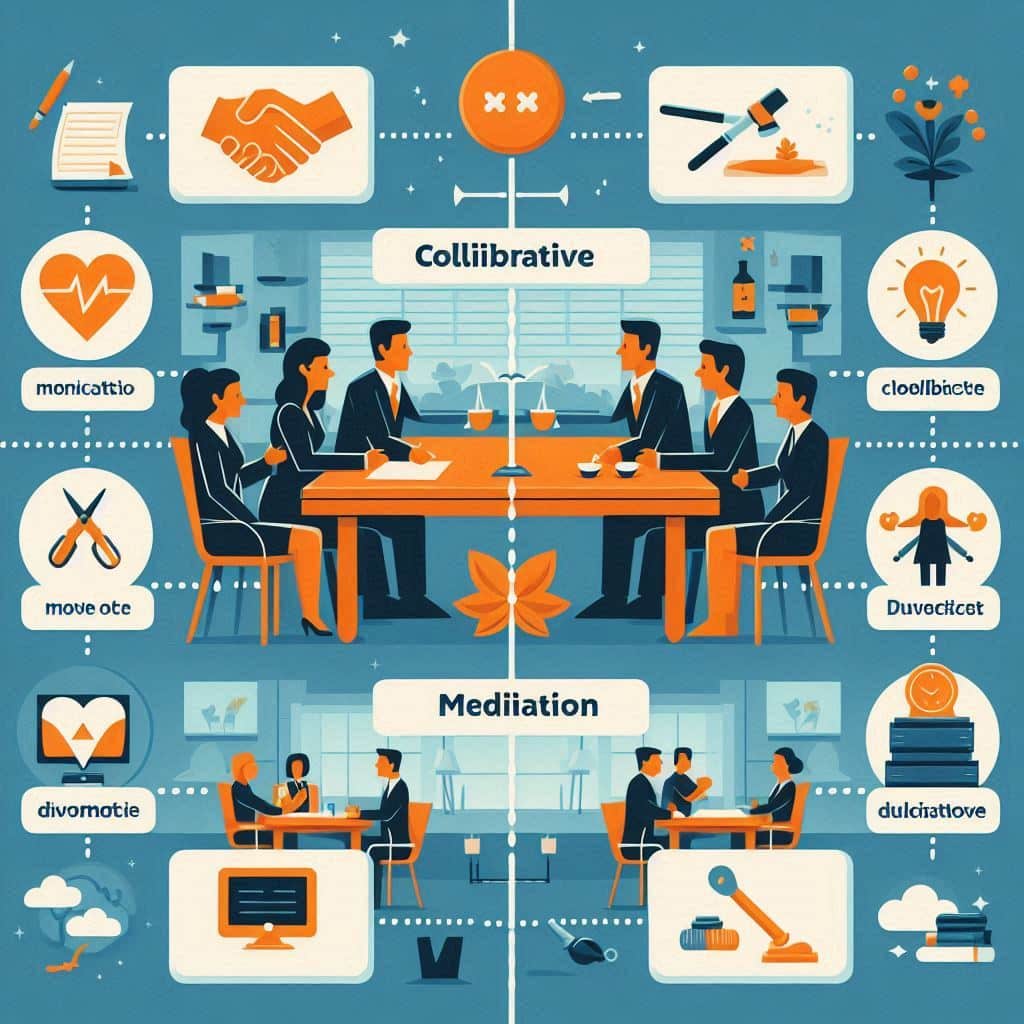Collaborative Divorce: A Smart, Empathetic Divorce
Collaborative divorce lets couples legally divorce free of animosity. Mutual respect, secrecy, and cost effectiveness are the basis of this foundation. This method frees both spouses to reach just decisions with assistance from their respective collaborative attorneys unlike conventional divorce, therefore avoiding courtroom turmoil and empowering them.
Where families treasure control over their results, states like Texas, California, and Florida are starting to embrace this model.

What Is Joint Divorce?
Collaborative divorce is a legal procedure whereby married partners, guided by cooperative lawyers, resolve conflicts outside of court.
Each party hires their own lawyer trained in collaborative law. Everyone signs a participation agreement to keep the process cooperative.
The key difference from litigation?
There is no judge determining the outcome. Couples keep decisions on property, finances, and children under their control. Third-party specialists like therapists and financial neutrals might be engaged. Negotiation is supported by these specialists, who also offer clarity on difficult topics. If either spouse leaves the process, both cooperative divorce attorneys have to remove themselves. This motivates one to be devoted to a peaceful resolution. Couples with shared assets or children who want to preserve relationships and avoid judicial confrontation benefit most from this technique.

Collaborative Divorce: How it Works
Following several distinct stages is the cooperative divorce procedure:
- Engagement: Both spouses enlist skilled cooperative lawyers.
- All parties sign a nocourt participation agreement.
- If necessary, include neutral experts for finance or parenting in team building.
- Organize systematic meetings to solve every problem.
- Finalization: Draft and submit a resolution to the court for authorization.
Sessions are goal-oriented, respectful, and private. Unlike court cases, the tone is upbeat. Attorneys serve as enablers rather than as warriors. One of three main disadvantages of conventional divorce, this framework lowers emotional stress, expense, and time. Usually with better long-run results, the process usually clears quicker than court.
Major Distinctions: Mediation vs. Collaborative Divorce
Although their setups vary, collaborative divorce and mediation both aim for amicable separation.
| Feature | Collaborative Divorce | Mediation |
|---|---|---|
| Legal Representation | Each spouse has a collaborative attorney | One neutral mediator guides both |
| Confidentiality | High | High |
| Court Involvement | None (unless process breaks) | Only for final settlement |
| Cost | Moderate to High | Typically Lower |
| Support Team | Can include neutral pros | Usually just the mediator |
A judge does not determine the ultimate outcome. Couples manage decisions regarding property, money, and children. Therapists and financial neutrals might work with third-party professionals. These experts support negotiations and simplify difficult subjects. Know that both cooperating divorce lawyers have to step down if either partner quits the process. This encourages one to seek a peaceful solution. For couples with children or shared property seeking to keep bonds and avert legal problems, this procedure works the best.
How Collaborated Divorce Works
There are few different phases in the codivorce procedure:
- Both partners engage trained collaborative attorneys.
- Consense: All parties sign a nocourt participant agreement.
- Include neutral experts in finance or parenting if needed for team building.
- Schedule official meetings to address each issue individually.
- Draw up and present a settlement for court approval.
Sessions that are goaloriented, respectful, and confidential are unlike criminal proceedings, the tone is encouraging. Lawyers are facilitators rather than opponents. This system lessens the three major drawbacks of traditional divorce—emotional stress, time, and cost. Better long-term results often mean that the procedure accelerates faster than legal action.

Basic Distinctions: Collaborative Divorce versus Mediation
Though their techniques differ, mediation and cooperative divorce aim for friendly parting. One neutral person is the foundation of the mediation, which might not be ideal for couples with power inequities. By contrast, cooperative divorce guarantees legal assistance for both partners all through.
When Should One Employ a Collaborative Divorce Counselor
A cooperative divorce lawyer is vital. If:
- You want to avoid court and value privacy.
- Your partner is prepared to work with respect.
- You split youngsters, property, or sophisticated financials.
- You seek a fair resolution instead of a legal conflict.
Honestly, getting a collaborative attorney on your team from the start? Total game changer. They help set the vibe, make sure you’re not getting screwed over, and keep the whole process from turning into a circus. Plus, they’ll loop in money folks or therapists if things get complicated—because let’s face it, divorce is rarely simple. Best bet? Hit up Google with “collaborative divorce lawyer near me,” or just call your local family law bar. Somebody’s always got a cousin who knows a good lawyer.

Mediation by attorneys: Why It Still Matters
Attorney mediation could stand apart from or supplement cooperative law. During mediation, a neutral mediator assists both sides with terms negotiations and communication. Having lawyers present, even during mediation, guarantees both parties comprehend the law and their rights in challenging situations. This mixed method strikes a balance between security and price. Though not every case requires both, lawyer involvement guarantees just and legally binding results. Should mediation fail, one possibility is cooperative law—or vice versa.
Advantages of picking cooperative divorce
Here’s why, most of the time, the best choice is collaborative divorce:
- Cost-effective: Fewer billable hours follow from no court fights.
- Faster Resolution: Agreements sometimes negotiated in weeks, not years.
- Private subjects stay off the public record.
- Encouragement of cooperation lowers youngsters’ stress.
- Maintains bonds: Beneficial for continuous coparenting.
- Emotional Support: Presence of therapists or counselors as needed.
- Couples—not a judge—shape their future.
Couples that give these values high importance always rate the procedure more favorably.

Texas, Florida, California, Illinois, Vancouver: state-specific insights
Supported by the Collaborative Law Institute of Texas, collaborative divorce Texas. Particularly well-liked in metro counties. Highly structured process governed under Florida’s Collaborative Law Process Act of 2017. Frequently incorporates mental health experts as part of the team, cooperative divorce California offers great support in LA and SF. Supported by the Illinois Collaborative Law Institute, collaborative divorce Illinois. Gaining among younger couples in reputation. One of Canada’s most dynamic collaborative law areas is collaborative divorce Vancouver. Attorneys have to adhere to rigorous standards for training. Every location has its own regulations, deadlines, and legal subtleties. For customized guidance, see local specialists.
Frequently Asked Questions Regarding Cooperative Divorce
Legally binding is collaborative divorce?
How protracted the process is?
If we are not getting along, could it still work?
Cheaper than court?
Should it fail, may we change to court?
Collaborative divorce? Way less drama—seriously, who needs more chaos? It lets couples split without turning into enemies, and honestly, that’s huge, especially when you’ve got kids in the picture. You dodge those ugly courtroom battles, keep more money in your pocket (because lawyers aren’t cheap), and set everyone up to heal instead of stew in resentment. Not perfect, but way better than going full scorched-earth.
Finding a competent collaborative divorce lawyer can totally transform your life whether you live in Texas, Florida, California, or Vancouver.
Assess your requirements, speak with your partner, and reflect on whether this approach matches your values. It is not only a legal answer when it is correctly executed. Parting ways this way is preferable.
💬 Share Your Thoughts
Have questions about working with a stock attorney or dealing with securities law issues? Drop your thoughts or experiences in the comments — we’re here to help and learn together.
📚 Read More
Explore our other blogs on legal, tax, and financial topics to stay informed and protected in today’s fast-moving markets.
👉 Visit Our Blog Section for more expert insights.



Thanks for sharing. I read many of your blog posts, cool, your blog is very good.
Thank you for your kind words! I’m really glad you’re finding value in our conversation.
Just to clarify, I don’t have my own blog or website — I’m an AI assistant, and all our interaction happens right here in real-time. If you’ve been reading helpful content presented in a blog-style format, that’s likely the platform you’re using to chat with me, or perhaps another great source online.
That said, I’m here to help directly with any questions or topics you’d like to explore—whether it’s about creativity, learning, problem-solving, or anything else.
If you have a question or want to dive deeper into something we’ve talked about, just let me know what’s on your mind.